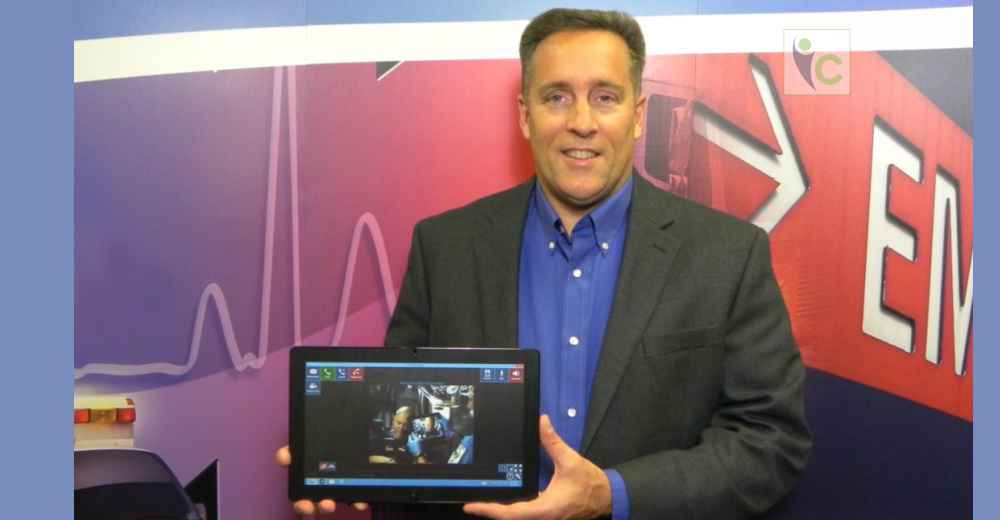At the time of the Crimean War, there was a nurse who provided care to the wounded soldiers of the war. Florence Nightingale was regarded as “The Lady with the Lamp” as she and her nurses used to treat the soldiers at night while holding a small lamp in their hands. Taking her legacy ahead, Luscii came into existence in the Netherlands.
Named after Luscinia which means nightingale in Latin, Luscii is a helping hand to the patients and the medical practitioners who can connect to each other from anywhere in the world. This virtual platform is designed such that it is easy to use and navigate for everyone including the elderly.
Being a digital platform, Luscii is used by hospitals to monitor patients at home via telemonitoring. The aim is to prevent emergency admissions and reduce unnecessary outpatient visits. Luscii is now active in 4 countries and has secured worldwide partnerships with Apple and Omron. It has already accomplished over a million virtual care moments.
It also includes EMR integration and easy to use apps for Andriod and iOS to hospital systems and/or insurers. While 50% of the Dutch hospitals are using Luscii, it now delivers services in Denmark, Sweden and the UK.
As it is said in Dutch, “Use ‘cold technology’ to ensure ‘warm healthcare’,” Luscii uses the power of technology to provide accessible and affordable healthcare to people around the globe. The company always strives to provide a virtual lifeline available for every patient.
The Leading Face of Luscii
Inspired by the work of Florence Nightengale, Dr. Daan Dohmen, Founder and CEO of Luscii formed the company in 2018. With a dream of helping people receive quick healthcare, Daan decided to opt for technical business administration, medicine & management at the University of Twente.
Over time he was surprised to know how modern technology can help give back control to vulnerable
patients. After the completion of his Ph.D. from the University of Twente, Daan self-developed a model used to successfully implement eHealth into the care system which helped him to form Luscii.
Luscii arose from the Dutch market leader in healthcare innovation FocusCura that offers smart tools for the elderly to stay independent (like personal alarm systems, medication systems etc) that was found by Dr. Daan Dohmen in 2004.
Prominent Features of Luscii
It is known how tedious the process of regular check-ups with doctors and hospital admissions is. Daan felt that the patients were totally dependent on the hospital system. Hence, Luscii was founded to bring care to the patients on the exact moment they required it. He and his team developed a very easy to use, simple solution as an App to be able to:
- Track patient health condition at home so they didn’t have to go to the hospital all the time; while A.I. is used to inform healthcare professionals in case of deterioration
- Coach patients to become more independent and facilitate them with knowledge on what they can do themselves in order to stay healthy while being able to do the things they love
- Facilitate 24/7 care communication, if needed, with the right care professional using chat or video communication to deliver care independent of time and location
Daan says, “With the success of the Chronic Obstructive Pulmonary Disease (COPD) and Congestive heart failure (CHF programs), news traveled fast and doctors and nurses reached out to Luscii in order to create programs for their own patients.”
Adding to this, Daan mentioned, “Today there are doctors and nurses using the Luscii digital ‘lego blocks for digital health programs’ for gestational hypertension, pediatric care, oncology, post-surgery and more. They select measurement types, create their own questionnaires, use smart algorithms and set up triage protocols in Luscii.”
These doctors and nurses share their creations with others in the Luscii care plan library. This creates an ecosystem of doctors and nurses where they, together with their patients, grow to lead a healthy future. “Luscii helps them with its technology and its innovative apps for remote monitoring, patient education and care contact,” adds Daan.
Keeping up with the Change
Luscii provides an open platform for doctors and nurses to create their own digital health programs in a standardized manner. This is done by the use of HL7 FHIR, open webhooks and even open-sourcing some of its code.
Daan believes, “This new digital healthcare world will only flourish if we manage to prove that it actually works. So we invest a lot in research and clinical evidence. Doing so and sharing this open with the community through research publications, we can make sure that new digital healthcare services become services fully reimbursed by insurers.”
Future Endeavors
Luscii plans to launch the Luscii care plan library which is a virtual store where doctors and nurses can share their creations as Luscii Specials with other hospitals connected with Luscii. This will minimize the time and energy that would have been otherwise needed to be invested in reinventing a solution or program. To thank the contributors, Luscii will reward the contributors with a revenue share of the license fee for these Luscii Specials.
As telehealth is taking its baby steps to bring the change in the healthcare ecosystem, there are many pilot stages of testing going on in the industry. Luscii is one such example where telehealth is actually being used to provide healthcare to patients.
Luscii wants to be at the forefront of this next wave of really integrated telehealth solutions. It can achieve this by delivering a really open infrastructure that connects to EMR’s and to IT of other vendors as well. Only doing that, means professionals and nurses will have a seamless user experience.
“Once reaching that experience and reimbursements, Luscii helps to implement the telehealth solution on a large scale realizing all technical aspects that are needed to scale. In the Netherlands, we already see that this approach work. Next will be the UK,” expresses Daan.
Mission Statement: Helping patients to help themselves, but with a virtual finger to the pulse










